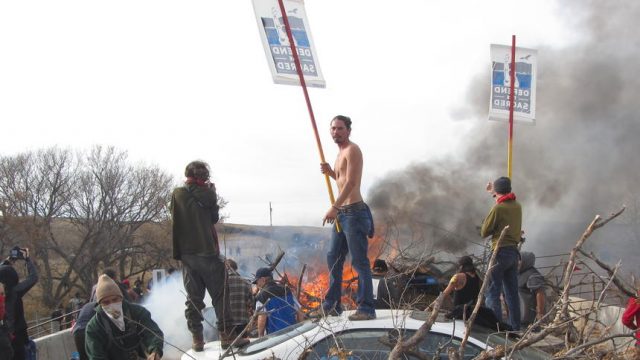As the #NoDAPL Zealots Leave North Dakota a Sense of Pragmatism Takes Hold at Standing Rock

When the Obama administration ordered the U.S. Army Corps of Engineers to withhold an easement for the Dakota Access Pipeline many of the environmental zealots who joined the Standing Rock Sioux Tribe’s protest against the project declared victory.
But now that the often violent and unlawful protests have died down, and the out-of-state extremists have left North Dakota’s brutal winter behind, it seems a sense of pragmatism has taken hold among tribal leadership.
Standing Rock Chairman David Archambault has indicated that his tribe is ready to work with President-elect Donald Trump on building pipelines and other sorts of infrastructure. “We haven’t taken a stance against oil development or energy development,” a Standing Rock representative said last week after a meeting with Trump. “We realize that’s part of the world today.”
Now the tribe is talking about forming their own utilities commission to coordinate with state and federal regulators on projects impacting tribal land (emphasis mine):
Tribal Chairman Dave Archambault II said the tribe has started the process since Standing Rock has been in a months-long fight against the 1,172-mile Dakota Access crude oil pipeline, which is proposed to cross the Missouri River just north of the reservation, over fears that a leak in the line would pollute the river and tribal water supply.
Archambault said the pipeline battle revealed flaws in state and federal law pertaining to tribal consultation and input on infrastructure projects — something he feels a tribal utilities commission could rectify.
“I think it’s in everyone’s interest to have some kind of regulatory authority,” he said.
The tribe will first need to create a regulatory code before forming a commission, according to Archambault, who said the new code, once written, has to be posted for 30 days to garner tribal member feedback.
“The process takes time. It’s not going to happen overnight,” he said.
The commission would have authority over all utilities infrastructure, from water lines to power lines, Archambault said. And despite the opposition to Dakota Access, the creation of a commission would not rule out the possibility of crude oil pipelines on the reservation.
This is great news.
For one, it’s clear the tribe is leaving behind the intransigent rhetoric of the environmental extremists who joined them these last several months in the protest against the Dakota Access Pipeline. This will serve the tribe’s interests better in the long run. Fossil fuels are a reality in our modern economy. They’re not going away any time soon. The “leave the oil in the soil” chant from the #NoDAPL protests is nonsense.
Fossil fuels can and should be developed and transported to market safely. If the tribe wants a seat at the table to help make that happen, good on them. It’s certainly more productive than throwing rocks and bombs and setting things on fire.
For another, this is a positive step in the direction of tribal sovereignty. North Dakota Congressman Kevin Cramer has been fighting to give tribes more say over the regulation of energy development on their lands for years now. Back in 2014 Cramer confronted the Obama administration over their opposition to a bill which would have given tribes more flexibility in building gas gathering lines to address flaring from oil development.
Could tribes like Standing Rock use this additional regulatory oversight to block energy development and related infrastructure on their lands? I suppose. That would be their right. But I think it’s far more likely that the tribes, given an opportunity to directly oversee that sort of activity, would be more likely to permit it.




